home > articles > theology > A Theology of Beauty
by Dr. Andrew Corbett
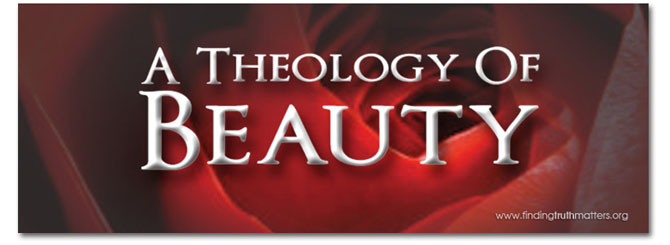 For many Christians their relationship with God is so certain that they rarely question it. They enjoy His presence in their life. They have no problem with balancing faith and certainty. Through spiritually unveiled eyes they see the hand of God guiding them and the events of human history. But nothing reminds them more of God and what He has done than beauty.
For many Christians their relationship with God is so certain that they rarely question it. They enjoy His presence in their life. They have no problem with balancing faith and certainty. Through spiritually unveiled eyes they see the hand of God guiding them and the events of human history. But nothing reminds them more of God and what He has done than beauty.
Not only is beauty one of the most faith-strengthening gifts of God, it is also one of the most powerful arguments for God. This notion is referred to by theologians as the Argument from . Not generally known for his contribution to Theology, it was the fictional detective Sherlock Holmes who most famously noted the connection between mankind’s appreciation of beauty being an argument for God (whom he called “Providence”) –

Yet God has made everything beautiful for its own time. He has planted eternity in the human heart, but even so, people cannot see the whole scope of God’s work from beginning to end.
Ecclesiastes 3:11
GOD IS INFINITELY BEAUTIFUL
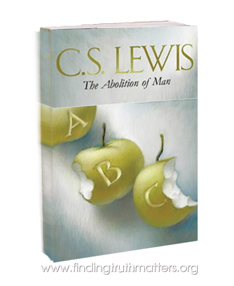
The Bible presents God as infinitely beautiful. It uses words such as splendour, majesty, glory, honour, radiance, and delightful. Little wonder then that such a God would leave His ‘beauty touch’ on everything He created! Those who have caught a glimpse of God described the experience as: beholding, adoring, admiring, gazing. There is something infinitely attractive about God that awakens within us a deep knowledge that we were created and designed for a higher purpose.
C.S. Lewis somewhat defends the Argument from Aesthetics for the existence of God in his book, The Abolition Of Man. For Lewis, the fact that certain things are objectively beautiful is a powerful argument for God. For Sherlock Holmes, the rose was a mystery that led to belief in God. For C.S. Lewis, the fact that we humans crave, appreciate, recognise, and delight in beauty, pointed to all people being created in the image of a God of beauty. He argued that because beauty was objective, the idea that true beauty was merely a conjured feeling in response to something one finds appealing, could not be countenanced. For Lewis, the idea that God created beautiful things is confirmed by our observation of beautiful things. The materialist denies that such beauty actually exists. Instead, the materialist asserts that the viewer merely feels that something is beautiful.
“…the well-known story of Coleridge at the waterfall. You remember that there were two tourists present: that one called it ‘sublime’ and the other ‘pretty’… Gaius and Titius comment as follows: When the man said This is sublime, he appeared to be making a remark about the waterfall … Actually … he was not making a remark about the waterfall, but a remark about his own feelings. What he was saying was really I associated in my mind with the word “Sublime”, or shortly, I have sublime feelings.'”
The Abolition of Man, pg 2
Lewis goes on to show that certain things are beautiful because they are. He gives the reason for this as creation reflecting the Creator. If Creation is beautiful, then the Creator must be infinitely beautiful.
THE DEFINITION OF BEAUTY
The materialist is forced to regard beauty as utterly subjective – “Beauty is in the eye of the beholder.” If it can be shown though, as C.S. Lewis does, that anything is intrinsically endowed with beauty then the materialist’s argument (that beauty is purely subjective) is shown to be false. The dictionary defines beauty as –
1. The quality present in a thing or person that gives intense pleasure or deep satisfaction to the mind, whether arising from sensory manifestations (as shape, colour, sound, etc.), a meaningful design or pattern, or something else (as a personality in which high spiritual qualities are manifest).
2. a beautiful person, especially a woman.
3. a beautiful thing, as a work of art or a building.
4. Often beauties. Something that is beautiful in nature or in some natural or artificial environment.
5. an individually pleasing beautiful quality; grace; charm: a vivid blue area that is the one real beauty of the painting.
6. Informal. a particular advantage: One of the beauties of this medicine is the freedom from< aftereffects.
7. (usually used ironically) something extraordinary: My sunburn was a real beauty.
Dictionary.com
Of course, beauty is better sensorially experienced than defined. That is, it is easier to show beauty than either define it or explain it. The implications of understanding of beauty in this way are theologically tremendous! The world which the materialist posits is one comprised of nothing but atoms randomly connected. Intrinsic beauty does not exist in the materialist’s view of the world since this would necessitate intentional artistry which ultimately requires an immaterial Creator.
WHY IDEAS ABOUT BEAUTY MATTER
How we understand beauty has a bearing on how we see the world and our place in it. The idea that all beauty is artificial and not universal, is an idea with dangerous consequences. The Bible continues to place tremendous value on the importance of getting our ideas right. In a world that often celebrates nonsensical ideas, it sounds almost out of step with culture for someone to say that an idea can be wrong or false. While it’s true that all people are equal, it is not, however, true that all the ideas are equal. The Apostle Paul wrote to the Romans about people who refused to acknowledge their Creator as having become darkened (misled) in their thinking.
¶ Yes, they knew God, but they wouldn’t worship him as God or even give him thanks. And they began to think up foolish ideas of what God was like. The result was that their minds became dark and confused.
Romans 1:21
AN ALIEN IDEA ABOUT BEAUTY HAS BEEN SMUGGLED INTO WESTERN THINKING
Through the ages, mankind has attempted to emulate – not just the beauty around us – but meaningfully create beauty. This pursuit led to portraying, and then conceptualising.
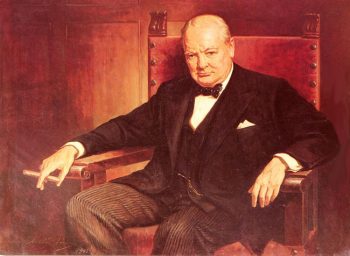 |
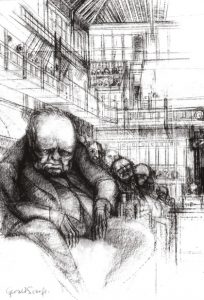 |
| A portrayal of Winston Churchill by artist Arthur Pan, 1942 | A conceptual drawing of Sir Winston Churchill depicting his last day in the House of Commons in 1964, by Gerald Scarfe |
The development of conceptualising led to the formation of symbols and symbolic thought, which eventually led to the development of writing. Written language is actually a system of symbols. But the true beauty of writing is not so much in its symbols as it is in its concepts. A moving story, a dramatic tale, a courageous adventure, can all be described as beautiful writing without reference to the original pen or key strokes. This appreciation of literary beauty is made possible because human beings have the unique capacity to create and then interpret that creation conceptually. This has implications for how we understand beauty. It has been noted that the Creator has both designed and utilised this in His communication with mankind within the message of the Bible. Unlike other religious holy books which may only contain religious or ethical rules, the Bible is actually a love story with a beginning, middle and end. Woven through its pages is dramatic narrative, artistic poetry, emotive parables, and highly symbolic apocalyptic portends. It is a work of literary beauty.

THE MISUSE OF ‘NATURAL’
My wife and I enjoy the natural beauty of the Tasmanian wilderness. For the past few years we have hiked much of Tasmania’s wilderness and forests. We deeply appreciate natural beauty. We recognise the high value of conservation efforts in these World Heritage areas. But even the natural beauty of the Tasmanian bush can sometimes benefit from being tamed. Just because something is natural doesn’t mean that it is perfect or can’t be improved with human intervention. Neither does it mean that every aspect of nature has equal beauty. There is great danger in succumbing to the false idea that natural always means right, good, or beautiful. This idea becomes especially dangerous when it spills over into how we regard what it means to be a good person.
We all have certain natural desires, urges, and motivations. Just because these desires feel natural – or even if they can be shown to actually be natural – it is not moral justification for any behaviour resulting from these desires. Our most natural inclinations are not always beautiful. There are many people who have been the victims of another’s actions resulting from their abuser’s natural desires. Yet, some people posit that all natural desires are right, and even good. Some go so far as to say that since God has designed each person He has given them certain appetites, including sexual ones, which must therefore be morally acceptable.

This unfounded idea is now used repeatedly by those seeking to justify their varied sexual proclivities (which have always been regarded by civilised societies as immoral). Despite the unchallenged promotion of the idea that aberrant sexuality is ‘hard-wired’ in people – there is no chromosomal, genetic, bio-chemical, brain-wave pattern, as the cause for immoral sexual attraction. Because of this lack of scientific support for unnatural sexual attraction it is difficult for its advocates to morally justify it. This is why they then borrow, a largely unchallenged idea, from the Environmentalist Movement: natural is right … it feels natural to me, therefore I must be hard-wired this way and that means I can’t help it – thus, it must be morally acceptable.
This type of reasoning is hardly tolerated for other kinds of moral justifications made by murderers, rapists, and thieves. After all, they could similarly claim that they too had overwhelming natural inclinations to behave how they do. But any such claim would be instantly and reasonably dismissed.
The kind of sexual intimacy prescribed in the Bible can reasonably be viewed as natural by design even when it may not be by individual desire. This expression of intimacy between a man and woman is only made available to them via the most intimate commitment to each other to the exclusion of all others for life. This culmination of physical, emotional, and spiritual union is rightly thought of as beautiful.
NOT ALL NATURAL URGES ARE BEAUTIFUL
At the outset of this article I asserted that the idea of natural equating to ‘moral’ has largely been advanced by those usually identified with the Environmental movement. This assertion can easily be sustained. Tasmania, where I live, is the birthplace of the Greens Political party. Despite being elected on a platform of protecting native forests, once elected, Greens Party politicians have consistently prioritised the promotion non-life policies such as abortion, euthanasia, and same-gender marriage. (Pope Benedict described this as advancing ‘a culture of death‘.) Politics is beautiful when it protects and promotes human life and flourishing.
HOW CAN WE DETERMINE WHAT IS MORALLY BEAUTIFUL?
While it is unreasonable to argue that what is natural must automatically be regarded as moral, it is not unreasonable to argue that there is a ‘Natural Law’. Professor J. Budziszewski, from the University of Texas (Government & Philosophy) has done a masterful job in showing that there must be a Natural Law in his book- What We Can’t Not Know (Ignatius Press, 2011). He contrasts the arguments that what is natural must be considered moral with the Natural Law (which reveals what constitutes morality). I recommend this book for a fuller treatment of this subject. Suffice it to say that those who advocate that what comes naturally must be moral, such as Professor Peter Singer, undergird their definitions of morality on the foundation of pleasure. Professor Budziszewski points out that this is hardly the basis for identifying a universal moral code (the ‘Natural Law’) because ‘pleasure’ is so subjective. On the contrary, behaving in a morally beautiful way often if not usually requires a person to act on behalf of another’s benefit despite their own natural inclinations!
A BEAUTIFUL OFFER
How should we engage with those who have been misled into thinking that there is no beauty in the Creator’s design? These people see no intrinsic beauty in a rose, no reasonable beauty in an exquisite piece of music, no objective beauty in a piece of literature, no selfless beauty in politics, and no loving beauty in human intimacy.
I propose that we offer them something truly beautiful – our understanding, compassion, and kindness wrapped in the truth – that this world has been designed and created by God who is the ultimate standard of beauty. Perhaps this most unnatural response by those who understand the Creator’s Natural Law, toward those who feel compelled to break it, might go a long way to helping those battling with their sexual proclivities to feel the respect they so desperately crave and ache for. This might in turn help them to realise that since this world is even more beautiful than could have ever imagined, the God who caused it all, may just be the only truly deserving Person in the Universe of their adoration and admiration. The result could well be that those who truly feel anything but beautiful will come to experience True Beauty for the first time.
Dr. Andrew Corbett
Originally, 23rd March 2012, revised 22nd November 2017
2 Comments
Submit a Comment
-
Sale!

5 Things We Need To Do To Break Our Church’s 200 Barrier, Premium Audio
Original price was: $1.75.$0.95Current price is: $0.95. -
Sale!

A Morning With Izaak Walton – The Compleat Man, Premium Audio
Original price was: $1.75.$1.25Current price is: $1.25. -
Sale!
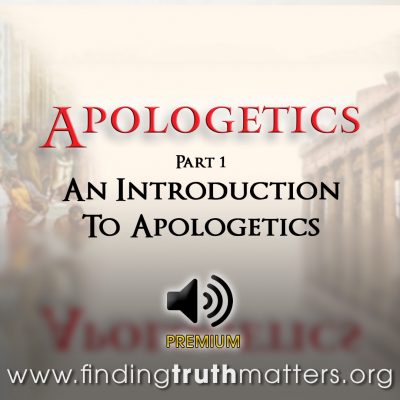
Apologetics Part 1 – Introduction To Apologetics, Premium Audio
Original price was: $1.75.$0.95Current price is: $0.95. -
Sale!
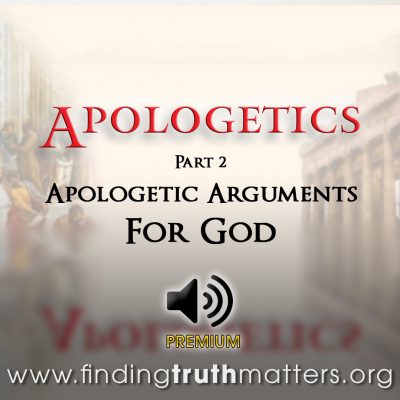
Apologetics Part 2 – The Apologetic Arguments For God, Premium Audio
Original price was: $1.75.$0.95Current price is: $0.95. -
Sale!
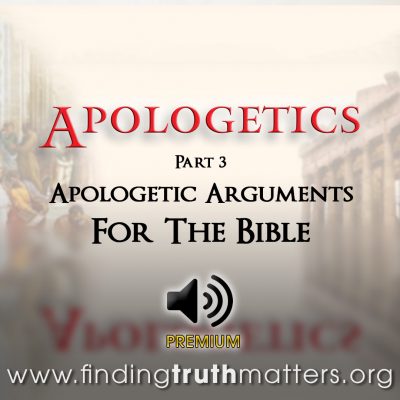
Apologetics Part 3 – The Apologetic Arguments For The Bible, Premium Audio
Original price was: $1.75.$0.95Current price is: $0.95. -
Sale!
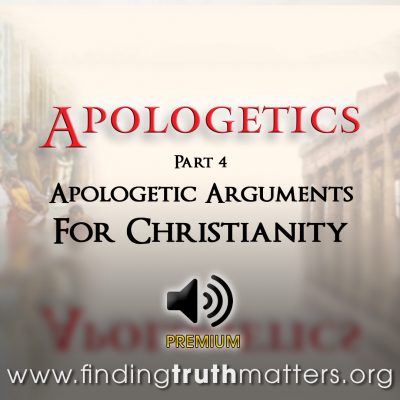
Apologetics Part 4 – The Apologetic Arguments For Christianity, Premium Audio
Original price was: $1.75.$0.95Current price is: $0.95.









































Thank you for this. If I want to learn more on the theology of beauty with appropriate biblical reference and support, can you suggest something.
Bincy, thank you. You could start with CS Lewis’s. ABOLITION OF MAN.
-AC